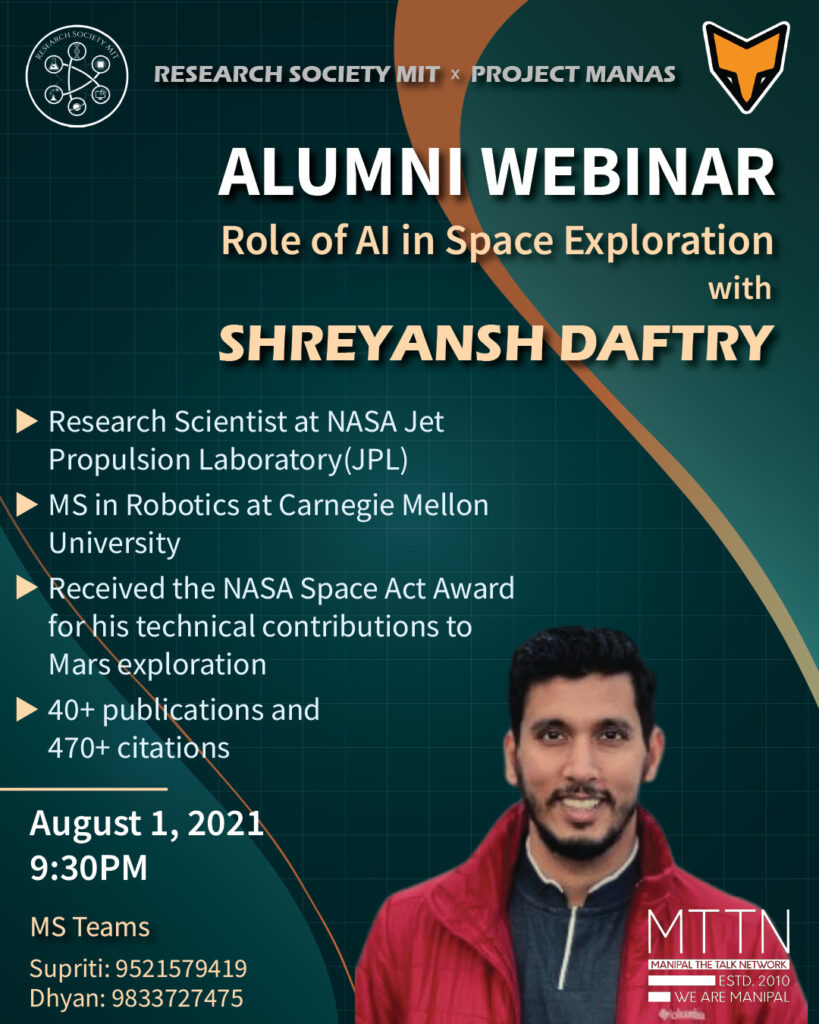
The Focus of the Webinar:
To date, Artificial Intelligence (AI) has proven to be an invaluable tool for improving people’s daily lives and business operations. Its far-reaching potential leaves no sector behind, including Space Exploration. It is believed that AI will be a crucial enabler for our galactic ventures and technologies, allowing us to achieve previously unimaginable feats. So, the best time to capitalise on the opportunities and serve the stream with cutting-edge solutions is now.
Are you fascinated by AI’s capabilities and possibilities in Space? Well, so are we. And what better way to learn than from an alumnus of our very own university? Research Society MIT and Project Manas bring to you a very special webinar with Shreyansh Daftry, former MITian from the batch of 2013. The discussion will be on the role of AI in Space Exploration, along with a personalised view of the speaker’s work and journey from college to NASA.
About the Speaker:
Shreyansh Daftry, an Electronics and Communications Engineering alumnus of MIT, Manipal, is a stunning bright gem of our institute. During his time at MIT, he interned at multiple organisations—as a research intern at IIT, Kanpur (2011), a software developer and research intern for Astrobotics Inc. (2012), where he developed multi-robot exploration of lunar caves as a part of Google Lunar X Prize. Daftry also interned at TU Graz, Austria (2013-14). He further pursued his Masters in Artificial Intelligence and Robotics from the School of Computer Science, Carnegie Mellon University, USA, where he was awarded a Graduate Research Fellowship. Soon after, he aided the Hawaii Space Exploration Analog and Simulation Mission 4 in the Mission support team for NASA’s human research program.
Daftry is currently a Research Scientist at NASA Jet Propulsion Laboratory (JPL) at California Institute of Technology. He is researching in Artificial Intelligence and works as a technologist in the Computer Vision group in the Autonomous Systems Division. He is delving further into Machine Learning and Autonomous Robotics. Of his multiple interests, some include Machine Learning, Human-Robot Interactions, Mapping & Navigation, and Systems Engineering.
About the Webinar:
Spanning an hour and a half, the webinar will be a condensed yet all-encompassing overview of the role of Artificial Intelligence in space exploration. Through exciting conversations, the speaker will discuss several aspects of his work and experience. He will talk about his technical contributions in computer vision in planetary exploration, the use of drones in the exploration of planets, path planning for autonomous rovers and terrain mapping. He will also discuss the various projects and research papers that he has worked on. The moderators will also take questions from the attendees for a more interactive session.
What will the audience take away from the Webinar?
Artificial Intelligence, being an upcoming field, is expected to grow tremendously in the coming years. Consequently, having skill-sets on its use in various industries is in high demand. Over the course of the session, attendees will get a better understanding of AI and its transforming applications. An opportunity to meet and interact with a vastly experienced speaker, talk about space exploration and its various aspects, and understand his field of work with a close view of his fantastic progress in the field — everything a technophile and an aspiring student wants to know!
Interacting with an incredibly talented speaker such as Shreyansh Daftry is a one-of-a-kind opportunity. There’s a lot to take from it, and a lot to be inspired by. So, mark your calendars for the weekend—Sunday, 1st August, and join Project Manas and Research Society MIT at 9:30 PM IST.
The event will be held online, through Microsoft Teams. Click here to register!
Written by Vaishnavi Karkare and Suhani Kabra for MTTN
Edited by Anika Shukla for MTTN
Featured Image by Project Manas and Research Society MIT

Leave a Reply
You must be logged in to post a comment.